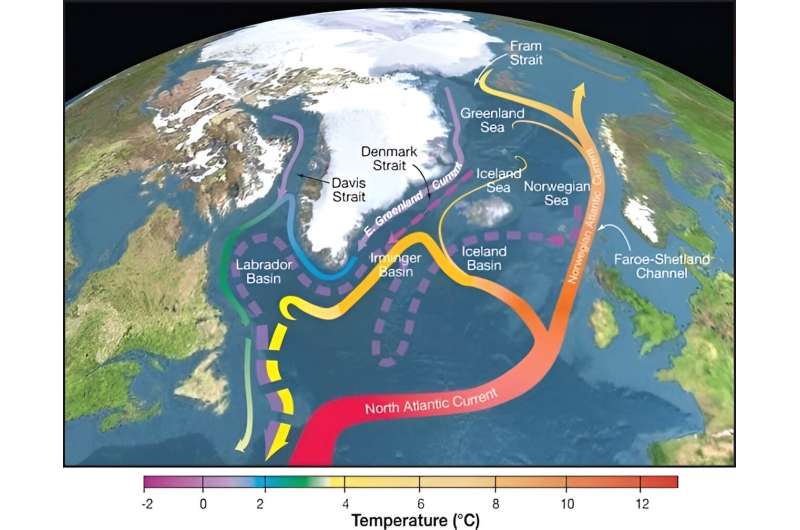This article has been reviewed according to Science X's editorial process and policies. Editors have highlighted the following attributes while ensuring the content's credibility:
fact-checked
peer-reviewed publication
trusted source
proofread
Past abrupt changes in North Atlantic Overturning have impacted the climate system across the globe, study shows

The Dansgaard-Oeschger events are rapid Northern-Hemisphere temperature jumps of up to 15°C in Greenland that repeatedly occurred within a few decades during the last ice age.
"These events are the archetype of abrupt climate changes and further increasing our understanding of them is crucial for more reliable assessments of the risk and possible impacts of future large-scale climate tipping events," says Niklas Boers from the Potsdam Institute for Climate Impact Research (PIK) and the Technical University of Munich, one of the authors of the study to be published in the Proceedings of the National Academy of Sciences.
In the new study, the research team investigates a global collection of cave minerals such as dripstones from different regions of the world. In a sense, these serve as climate archives from which data on precipitation changes during the last ice age can be obtained.
"Our results show that worldwide, atmospheric circulation and associated rainfall patterns have changed drastically and abruptly as a consequence of the Dansgaard-Oeschger events," says lead author Jens Fohlmeister, who was a scientist at PIK at the time of the research. "The impacts of these instances of past abrupt climate changes were felt globally, and most severely in the tropical monsoon domains."
The scientists were able to reproduce these impacts, suggested by more than 100 cave formations from 67 different caves distributed across all continents except Antarctica, with complex climate models. "This shows that we are on a good track in improving our models to be able to represent abrupt climate changes in more detail," adds Boers.
The research could further help to better understand how so-called tipping elements like the Atlantic Meridional Overturning Circulation (AMOC) react under future human-made global warming scenarios. Until now uncertainties in estimating the behavior of such tipping elements remain huge, despite extensive research work that has been carried out for several years. This calls for a continuation of the systematic investigations of past abrupt climate changes, the researchers argue.
"We have made a big step and added another puzzle piece toward more reliable assessments of the detailed global impacts that a tipping of a major Earth system component such as the AMOC might have," Boers concludes.
More information: Jens Fohlmeister et al, Global reorganization of atmospheric circulation during Dansgaard–Oeschger cycles, Proceedings of the National Academy of Sciences (2023). DOI: 10.1073/pnas.2302283120. doi.org/10.1073/pnas.2302283120
Journal information: Proceedings of the National Academy of Sciences
Provided by Potsdam Institute for Climate Impact Research




















